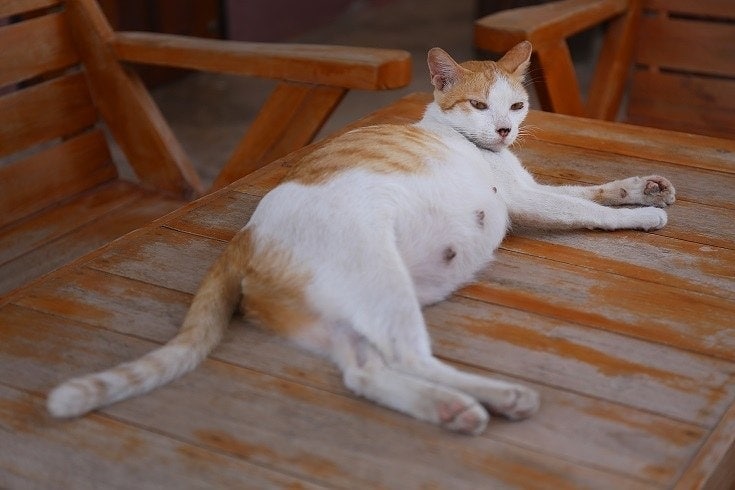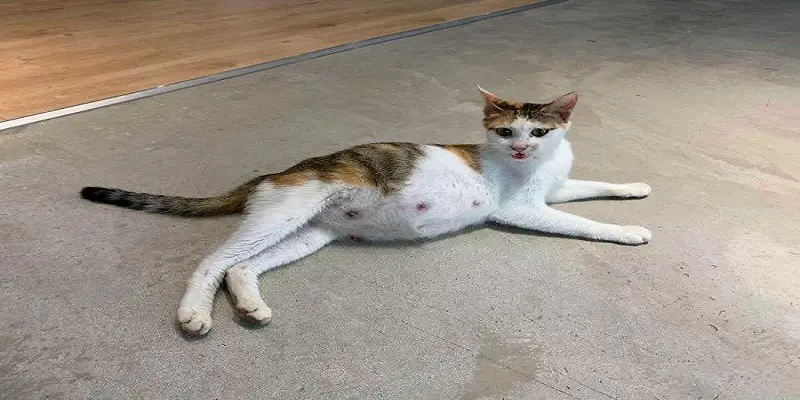Last Updated on January 14, 2025 by Pauline G. Carter
Cats can get pregnant as young as four months old. This is why it is important to get them spayed before they reach sexual maturity.
Cats are able to reproduce at a very young age, which means it is important to start thinking about their reproductive health early. Female cats can go into heat as early as four months old, which means they have the ability to become pregnant as well.
It is important for cat owners to spay their cats before they reach sexual maturity to prevent unwanted litters. While it may seem like a daunting task to have your cat spayed, it is a simple procedure that can greatly benefit your cat’s health and prevent overpopulation in cats. In this article, we will discuss the optimal age to have your cat spayed and why it is important.

Credit: www.hepper.com
What Is The Reproductive Age Of Female Cats?
Female cats are extraordinary creatures, capable of giving birth to adorable kittens that become companions for life. However, as with other animals, there is a specific age at which they can reproduce. The question remains: how young can cats get pregnant?
Let’s dive deep and learn more about the reproductive age of female cats.
Introduction To Reproductive Age
The reproductive age of a cat is the time when they are capable of mating and producing offspring. For cats, this time generally starts from when they reach puberty and achieve sexual maturity.
Puberty And Sexual Maturity In Cats
Cats typically reach puberty and sexual maturity when they are around six months old. However, this can vary depending on the breed and individual cat. Generally speaking, larger cat breeds tend to have a later onset of puberty. A female cat’s first estrus cycle, or “heat,” occurs during sexual maturity and is the point at which cats become fertile and capable of pregnancy.
Factors That May Affect Reproductive Age In Cats
While six months is the typical age for female cats to reach puberty, it’s essential to note that several factors may affect their reproductive age. These include:
- Breed: As mentioned earlier, breed plays a vital role in determining a cat’s reproductive age. Larger breeds tend to have a later onset of puberty, while smaller breeds often reach it earlier.
- Nutrition: Proper nutrition plays a crucial role in the overall health and development of a cat. Poor nutrition or a lack of essential nutrients can result in delayed puberty and a delayed onset of estrus cycles.
- Environment: The environment in which a cat lives can also affect its reproductive age. Stressful environments, a lack of adequate physical activity or mental stimulation, and inadequate hygiene can all impact a cat’s physical development.
- Medical conditions: Certain medical conditions, such as underactive thyroid glands, may delay a cat’s puberty, leading to a delayed onset of estrus cycles.
The reproductive age of female cats depends on various factors, including breed, nutrition, environment, and medical conditions. Understanding these factors will help you determine when your cat is capable of getting pregnant. As a responsible pet owner, it’s crucial to monitor your cat’s health and ensure that they receive the proper nutrition and care they need for optimal development.
How Young Can Female Cats Get Pregnant?
Female cats reach sexual maturity at different ages as compared to their male counterparts. Female cats can get pregnant as early as 4 months of age, also known as the feline puberty stage. Let’s take a look at the ideal breeding age for cats, risks associated with early pregnancy and kitten birth, factors that may encourage early pregnancy in cats, and consequences of early pregnancy in cats.
Overview Of The Ideal Breeding Age For Cats
The ideal breeding age for cats is between 8 and 12 months. During this time, cats are physically mature, psychologically stable, and have fully developed their reproductive organs. It’s important to note that cats that give birth before 8 months of age have a high risk of developing serious health complications.
Risks Associated With Early Pregnancy And Kitten Birth
Cats that give birth before they reach 8 months of age are likely to encounter a range of serious health complications that include but are not limited to:
- Increased risk of stillbirth
- Low birth weight in kittens
- Birth defects in kittens
- Malnourishment in nursing mothers
- Inadequate milk production in nursing mothers
- Shorter lifespan
Factors That May Encourage Early Pregnancy In Cats
Several factors can influence early pregnancy in cats, including:
- Genetics
- Overbreeding
- Living in colonies with unneutered males
- Early mating
Consequence Of Early Pregnancy In Cats
Early cat pregnancy can cause serious health problems, both for the mother and her kittens. As noted above, early kitten birth may lead to a shorter lifespan, birth defects, malnourishment, and inadequate milk production in nursing mothers.
It is essential to monitor your cat carefully and seek veterinary advice if you suspect pregnancy. Ensure that your cat is at least 8 months old before you attempt to breed them or have them sterilized to avoid unnecessary complications.
What Measures Can Be Taken To Prevent Early Pregnancy In Cats?
Cats are known for their ability to reproduce rapidly, but how young can cats get pregnant? Cats typically become sexually active around 5-6 months old. Once they reach this age, female cats are capable of becoming pregnant. It’s essential to understand that allowing cats to reproduce at such a young age can have significant health risks for them and their offspring.
Understanding The Importance Of Sterilization
Sterilization is the removal of reproductive organs in cats, which prevents pregnancy. Sterilization is vital in preventing early pregnancy in cats, and it also offers several other health-related benefits. Some essential points to clarify are:
- Sterilization eliminates the risk of reproductive cancers in cats, which is prevalent in unsterilized cats.
- Sterilized cats display fewer behavior issues associated with hormones, such as spraying in the house or wandering around to search for a mate.
- It significantly reduces the number of cats without shelter and starving to death on the streets.
- Cats who have been sterilized live longer lives than their unsterilized counterparts.
Promoting Responsible Pet Ownership Practices
As a responsible pet owner, it is vital to take the necessary measures to ensure your cat does not become pregnant too early. Keeping cats indoors and away from unfixed male cats is one way of reducing the risk of early pregnancies.
Another way to reduce the risk of early pregnancy is to get your cat sterilized. This not only prevents early pregnancies but also ensures that the cat is not contributing to the overpopulation of cats.
Promoting responsible pet ownership practices such as sterilization and providing a safe environment for your cat can significantly reduce the risk of early pregnancy in cats and the associated health risks. Cats can become pregnant quite early, so it’s up to the pet owner to take the necessary steps to prevent this from happening.
Taking good care of your cat ensures a happy and healthy life for both you and your furry friend.
Frequently Asked Questions Of How Young Can Cats Get Pregnant?
At What Age Do Cats Start To Reproduce?
Cats can start reproducing as early as 4 months old.
What Is The Optimum Age For Cats To Reproduce?
Cats should not reproduce until they are at least 8-12 months old.
How Many Kittens Can A Cat Have In One Litter?
Cats can have anywhere from 1 to 12 kittens in one litter.
How Many Litters Can A Cat Have In A Year?
Cats can have 3-4 litters in a year, but it is not recommended.
What Are The Risks Of Early Pregnancy In A Cat?
Early pregnancy in cats can lead to health complications such as malnutrition and developmental issues in the kittens.
Conclusion
Cats can begin reproducing as early as four months, making it essential to have them spayed or neutered as soon as possible. Ensuring that your cat is a healthy weight and receives regular veterinary care is also crucial to their reproductive health.
While younger cats may have successful pregnancies, the increased risk of complications highlights the importance of waiting until they are older and have matured physically and mentally. Additionally, early intervention in the form of spaying or neutering can help prevent unwanted litters and improve the overall health and lifespan of your feline companion.
As responsible pet owners, it is our duty to prioritize our cats’ well-being and make informed decisions when it comes to their reproductive health.

